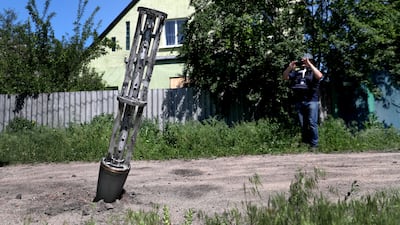President Joe Biden's administration will send cluster munitions to Ukraine as part of a new military aid package, the White House announced on Friday.
The move is contentious because the unexploded components of cluster munitions can kill and maim for decades after a conflict has ended.
The White House said it made the “difficult decision” to send cluster bombs after receiving written assurances from Kyiv “that it is going to use these in a very careful way that is aimed at minimising any risk to civilians”.
“We recognise that cluster munitions create risk of civilian harm from unexploded ordnance,” National Security Council Adviser Jake Sullivan told reporters.
“But there is also a massive risk of civilian harm if Russian troops … take more Ukrainian territory.”
Ukraine's ambassador to the US, Oksana Markarova, told The National that Kyiv will use the cluster munitions "very responsibly, because it is our territory and our people".
Ms Markarova added that "after the liberation of the territory where they were used, de-mining will be carried out immediately".
"We have shown a number of times that we are adhering to different conventions ... We will not use them in civilian urban areas, we will not use them in the territory of the Russian Federation, we’ll keep record where they are used," she said.
Cluster bombs have been banned by more than 120 countries under the Convention on Cluster Munitions, but Russia, the US, Ukraine and dozens of other countries including the UAE and Saudi Arabia are not signatories.
Mr Sullivan sought to paint a picture of unity even among Nato allies who are signatories to the ban, saying they “recognise the difference between Russia using its cluster munitions to attack Ukraine”.
“We feel that this will in no way disrupt the very strong, firm unity that we have” heading into next week's Nato summit in Lithuania, he added.
Ukraine has long sought cluster munitions from the US, arguing that the weapons would be effective at clearing trenches and other defensive fortifications where Russian troops are dug in.
A cluster munition, which can be fired by cannon or launched from the air, releases dozens or hundreds of smaller submunitions known as “bomblets” that can wreak havoc across a broad area.
Days after the war began in February 2022, then-White House press secretary Jen Psaki said Russia's use of cluster and vacuum bombs would “potentially constitute a war crime”.
Russian armed forces have used cluster munitions “in attacks that have caused hundreds of civilian casualties and damaged civilian objects, including homes, hospitals and schools”, according to a May report from Human Rights Watch.
An April 2022 Russian cluster bomb attack on a train station in Kramatorsk killed at least 58 civilians and wounded 100 others.
The rights group this year said “greater global efforts are needed” to protect and strengthen the Convention on Cluster Munitions.
Ukraine would welcome receiving the US weapons because they would have an “extraordinary psycho-emotional impact” on Russian forces, a senior Ukrainian official said on Friday.
“Undoubtedly, the transfer of additional volumes of shells to Ukraine is a very significant contribution to the acceleration of de-occupation procedures,” presidential adviser Mykhailo Podolyak told Reuters.
Opponents of cluster munitions say they can cause civilian casualties years after they have been deployed, as not all bomblets explode and are often picked up by children after a conflict ends.
According to the International Committee of the Red Cross, some bomblets have a high rate of failure to explode – up to 40 per cent, in some cases.
The Cluster Munition Coalition is a global civil society campaign working to eradicate cluster munitions.
Paul Hannon, co-chairman of the coalition's board, told The National the body was “shocked” by Washington's decision and fears it may create conflict for some of Ukraine's allies.
Kyiv “needs to consider the fact that a lot of countries have been supporting Ukraine with a lot of money to help them clear explosive remnants of war that are littering the country based on what Russia has been using”, Mr Hannon said.
“This kind of removes the moral high ground from Ukraine if they're going to use a banned weapon,” he added.
Mr Hannon argued that the long-term implications could further exacerbate the global food crisis that Russia's invasion of Ukraine sparked.
“Ukraine is one of the breadbaskets of the world – much of the world depends on its farming. If you're going to have these failed cluster munitions in agricultural areas, they're going be there for decades,” he said.
Secretary of State Antony Blinken said the cluster munitions form part of an $800 million aid package for Ukraine. It is the 42nd such package and the US has now given about $50 billion in security assistance to Kyiv.
"Russia started this unprovoked war against Ukraine. Russia could end it at any time by withdrawing its forces from Ukraine and stopping its brutal attacks against Ukraine’s cities and people," Mr Blinken said in a statement.
"Until Russia does so, the United States and our allies and partners will stand united with Ukraine, for as long as it takes."
The Pentagon says today's munitions have a reduced “dud rate”, meaning there will be far fewer unexploded rounds that can result in unintended civilian deaths. The US used cluster bombs extensively in Iraq and Afghanistan.
Defence Department spokesman Brig Gen Pat Ryder said the Pentagon has “multiple variants” of the munitions and “the ones that we are considering providing would not include older variants with [unexploding[ rates that are higher than 2.35 per cent”.
Asked how the cluster munitions, if approved, would help Ukraine, Brig Gen Ryder said they can be loaded with charges that can penetrate armour and fragment so they can hit multiple personnel – “a capability that would be useful in any type of offensive operations”.


